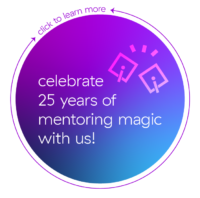In honor of Black History Month, we sat down with our Chief Program Officer Tarika Barrett to talk about mentoring, college aspirations, and why #blacklivesmatter.
iMentor: Tarika, thanks for taking the time to chat with us. As a leader in our organization and in the mentoring space, we’re looking forward to hearing your thoughts and reflections on college success, especially as it relates to Black History Month.
Tarika: Thank you for inviting me to this conversation!
iMentor: Your mom started one of the first mentoring programs in Jamaica more than 25 years ago. What kind of impact did that have on your life early on?
Tarika: I always thought my mom did it out of the goodness of her heart, and because things were really tough in Jamaica, but when I revisited this idea with her later, I found out the real story. At the time, there was a huge rural-to-urban drift in Jamaica that impacted the dynamics of family life. The other thing was migration. Mothers were leaving Jamaica to go to America, Canada, and England. My mom saw a lot of teenagers in high school who didn’t have the support system.
It made me value the fact that my mom always provided me with a lens to see outside of my own experience. I always had a sense that my circumstances could be different. I mean, we were not wealthy, but my mom and her work as a youth advocate always reminded me of how lucky I was.
iMentor: Was there an expectation in your household that you would go to college?
Tarika: Oh yeah. But I think what’s really humbling is that my grandmother had at most a fourth-grade education. And when her mother died, she dropped out of school to take care of 7 or more siblings. She was largely uneducated, and yet my mother went to Columbia University and got a master’s degree. She would cite people throughout her life who cared about her, mentored her, and believed in her as the reason she made it.
iMentor: Your mom navigated the college-application process in the United States. Was she able to help you when you were applying?
Tarika: My mom was determined to go to college and made her way. Despite this, she didn’t have really targeted advice that helped me navigate issues like choice, fit, or taking the SATs. She trusted me a lot with these big decisions. I’m deeply grateful that she instilled in me the notion of having a college aspiration, but as I reflect on my college application journey, mine offers another example of how much your background, exposure, and social capital affect what your options are and how they can be limited if you don’t have someone in your corner who can help you think about how to approach such a high-stakes decision.
iMentor: Does that make you proud of what iMentor’s mentoring program offers? Each of our students get a mentor who will work with them through the college process.
Tarika: Absolutely. You can’t minimize exposure. You can’t minimize having an example in your life. You may not even know the kind of effect you’re having as a mentor just by being present. It opens of the realm of possibilities, especially if the young person is a first-generation college student and doesn’t have a lot of exposure to real-life examples of people who have gone through the college process.
iMentor: Most of the students who we serve in our program are black and Latino. Why is it important for us to keep a national dialogue around effective interventions like mentoring for young people, particularly young people of color?
Tarika: If we’re not able to pivot and change our entire paradigm about the value and contribution of young black lives and young people of color, then we’re doomed to failure. Even if you want pull back and take the emotion from it. What are we investing in as a country if we want to create an oppressed underclass that can’t be successful? We know when we hear folks talk about prison reform, or the number of suspensions, or the disproportionate number of students of color in special education, it is a profound convergence of institutional racism. And we are only slowly making our way to naming it, and even it’s very painful for our country.
The hopeful part of it is, when you think back to the ’60s, students were at the forefront of the civil rights movement. Every student we connect with in our program potentially changes the conversation. And there’s more we can do to get students involved. We can challenge them to be brave and talk to them plainly. The bottom line is if we think that our success as a nation isn’t tied to each one of the young lives lost this year and last, then we are disillusioned. We have to, at our core, believe that the lives of young people matter, and that their voices are powerful.
Tarika Barrett, iMentor’s Chief Program Officer, has a diverse background in public education. Previously, Tarika served as the Senior Director of Multiple Pathways to Graduation in the New York City Department of Education’s Office of Postsecondary Readiness. Prior to joining the DOE, Tarika served as Deputy Network Leader of the Brooklyn-Staten Island Network of New Visions for Public Schools where she co-led a team of facilitators who delivered critical instructional and operational supports to a portfolio of 25 NYC schools.
